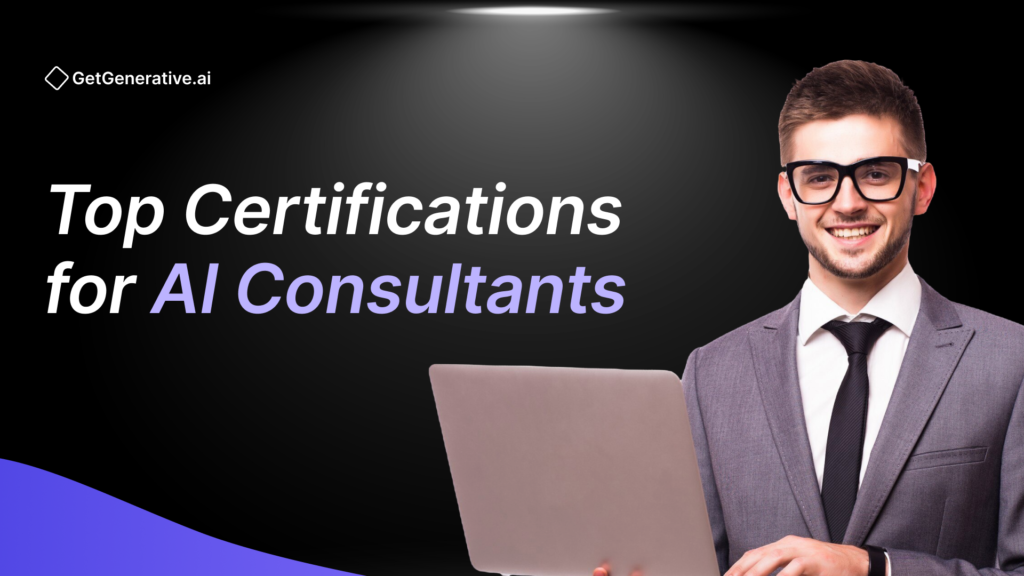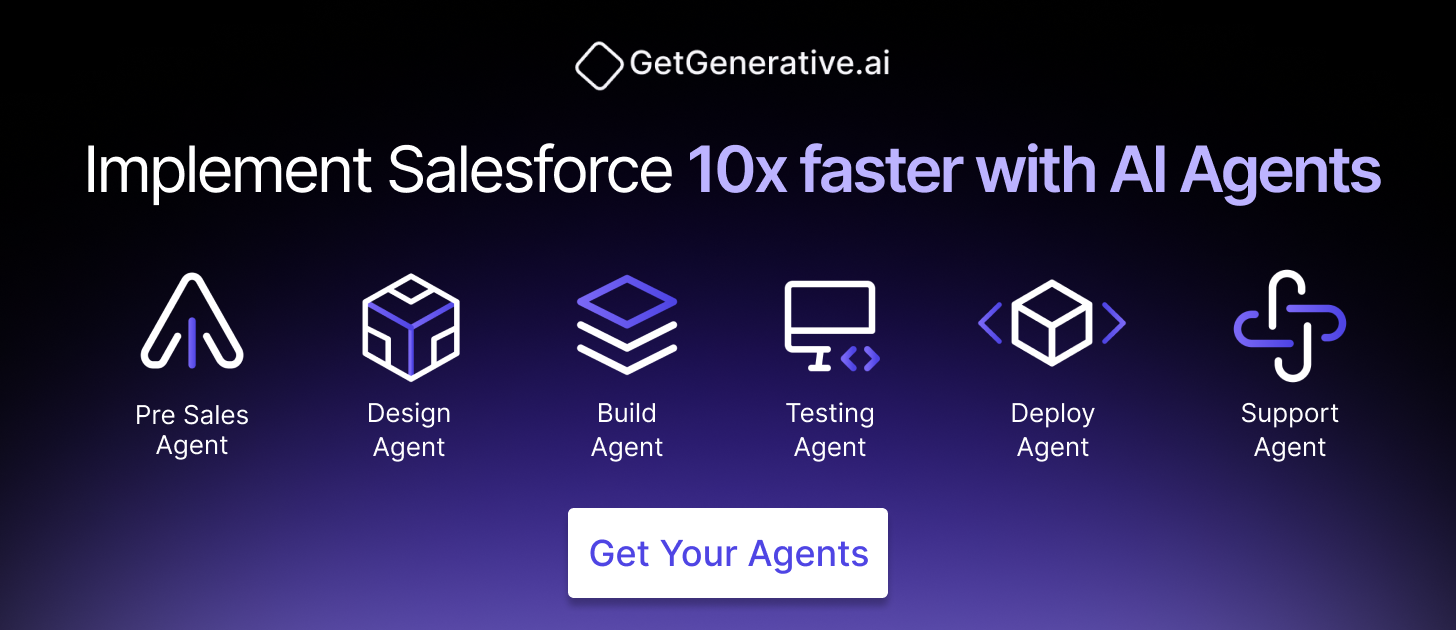Top Certifications for AI Consultants in 2025
Artificial Intelligence (AI) is transforming industries across the globe, and the demand for skilled AI consultants has skyrocketed. Whether you’re just starting in the AI field or are an experienced professional looking to validate your skills, obtaining the right certifications can set you apart from the competition.
In this blog, we’ll explore the top AI certifications that can help you become an in-demand AI consultant.
Why AI Certifications Matter
AI certifications offer a formal way to validate your expertise in this rapidly growing field. Companies seek professionals who not only understand AI theory but can also apply it in real-world scenarios. Certifications demonstrate your commitment to mastering AI technologies and methodologies, giving you a competitive edge in the job market.
Here are the top Certifications you should opt for in 2025:

1. Google Cloud Professional Machine Learning Engineer
The Google Cloud Professional Machine Learning Engineer certification is designed for individuals who want to apply AI and machine learning (ML) techniques to solve real-world business problems. This certification validates your ability to design, build, and deploy ML models on the Google Cloud Platform (GCP).
- Skills Covered: Data engineering, model development, MLOps, and machine learning operations on GCP.
- Ideal For: AI consultants focused on cloud-based ML solutions.
- Exam Details: 2-hour exam with multiple-choice and multiple-select questions.
2. Microsoft Certified: Azure AI Engineer Associate
For professionals working with Microsoft’s cloud services, the Azure AI Engineer Associate certification is an excellent option. It focuses on using Azure’s AI services to develop solutions like natural language processing, computer vision, and speech recognition.
- Skills Covered: AI workflow integration, cognitive services, and natural language processing on Azure.
- Ideal For: AI consultants implementing AI models in Microsoft environments.
- Exam Details: 90-minute exam with multiple-choice questions.
3. AWS Certified Machine Learning – Specialty
Amazon Web Services (AWS) is one of the most widely used cloud platforms in the world. The AWS Certified Machine Learning – Specialty certification validates your ability to build, train, and deploy ML models using AWS services.
- Skills Covered: Feature engineering, model tuning, and deploying ML solutions on AWS.
- Ideal For: AI consultants working on cloud-based AI projects, especially within AWS.
- Exam Details: 170 minutes, with multiple-choice and multiple-response questions.
4. IBM AI Engineering Professional Certificate
The IBM AI Engineering Professional Certificate is a popular choice for those wanting a solid foundation in AI. Offered through Coursera, this certification covers key topics such as machine learning, deep learning, and reinforcement learning.
- Skills Covered: Neural networks, deep learning, TensorFlow, and Scikit-Learn.
- Ideal For: AI consultants focused on developing machine learning models for business applications.
- Course Details: Self-paced, 6-course program
5. Certified Artificial Intelligence Practitioner (CAIP)
Offered by CertNexus, the Certified Artificial Intelligence Practitioner (CAIP) certification is designed for individuals aiming to gain a broader understanding of AI technologies and practices. The course covers AI implementation, ethics, and business case analysis, making it ideal for consultants who need to provide strategic AI solutions.
- Skills Covered: Machine learning, deep learning, and AI strategy.
- Ideal For: AI consultants providing end-to-end AI solutions.
- Exam Details: 90-minute exam with performance-based questions.
6. DeepLearning.AI TensorFlow Developer Certificate
The DeepLearning.AI TensorFlow Developer Certificate is highly recognized in the AI community. It focuses on TensorFlow, one of the most popular libraries for building machine learning models.
- Skills Covered: Building and deploying deep learning models with TensorFlow.
- Ideal For: Consultants specializing in machine learning model development.
- Course Details: 4-course series
Also Read – How To Become an AI Consultant: A Complete Guide
How to Choose the Right Certification
Choosing the right AI certification can significantly impact your career path as an AI consultant. With various certifications available, it’s essential to make an informed decision based on your current expertise, the technologies you plan to specialize in, and the specific industries or clients you intend to serve.
Here are some critical factors to consider when selecting the right certification:
1. Assess Your Current Skill Level
Before jumping into any certification, evaluate your current knowledge and skill set. Are you a beginner just entering the field of AI, or do you have some experience in machine learning or data science?
For beginners, certifications that provide foundational knowledge, such as the IBM AI Engineering Professional Certificate, might be ideal. For more experienced professionals, specialty certifications like AWS Machine Learning or Google Cloud’s ML Engineer certification can help deepen your expertise.
- Beginner Level: Look for certifications that offer a structured learning path, covering the basics of AI, machine learning, and data science.
- Intermediate to Advanced Level: If you already have experience in AI, focus on certifications that validate specialized skills or teach advanced concepts like deep learning or cloud-based AI deployment.
2. Focus on Industry-Specific Needs
Different industries use AI technologies in unique ways, so it’s crucial to choose a certification that aligns with the industry you plan to consult in.
For example, if you are consulting for healthcare or finance, certifications that emphasize ethical AI practices or explainable AI might be more relevant. If your target clients operate in industries that require advanced automation or predictive analytics, certifications focusing on machine learning and deep learning will be more appropriate.
- Industry Focus: Research the AI trends in your target industry and select certifications that meet those specific needs, such as ethical AI practices or predictive modeling.
3. Align with the Cloud Platform You’ll Use
Cloud platforms play a massive role in AI development and deployment. Each major cloud provider—AWS, Google Cloud, and Microsoft Azure—offers its own AI and machine learning tools, so it’s essential to choose a certification aligned with the platform most relevant to your client base or employer.
For example, the AWS Certified Machine Learning – Specialty is excellent for consultants working with AWS, while the Azure AI Engineer Associate is ideal for those focusing on Microsoft solutions. Certifications from these platforms not only help you master the platform’s AI tools but also make you a more attractive hire for clients already invested in those ecosystems.
- Cloud Focus: Choose a certification based on the cloud platforms your clients use or plan to adopt. For multi-cloud environments, gaining certifications across platforms may be beneficial.
Also Read – Generative AI Glossary: A Complete Guide to Key Terms and Concepts
4. Consider Specialization vs. Generalization
AI consulting roles can vary significantly—from building predictive models and deploying chatbots to advising companies on AI strategy and ethics. Depending on your career goals, you’ll need to decide whether to pursue a general certification or a specialized one.
For example, the Certified Artificial Intelligence Practitioner (CAIP) provides a broad overview of AI implementation and strategy, making it ideal for consultants offering end-to-end AI services. On the other hand, certifications like the TensorFlow Developer Certificate are highly specialized, focusing specifically on building deep learning models with TensorFlow.
- General Certifications: Good for consultants who need to provide diverse AI solutions across industries.
- Specialized Certifications: Focused on particular tools or technologies, suitable for consultants in technical roles like machine learning engineers.
5. Examine the Learning and Exam Format
Certifications come with different learning paths, ranging from self-paced courses to instructor-led sessions. Additionally, the exam formats may include multiple-choice questions, practical assessments, or performance-based tasks.
Some certifications, like the Google Cloud Professional Machine Learning Engineer, include hands-on components where you build and deploy ML models, which are crucial for consultants who will be implementing AI solutions directly. Consider whether you prefer self-paced learning or need the structure of an instructor-led course, and whether you’re prepared for hands-on assessments.
- Self-Paced Learning: Suitable for those who prefer flexibility in their study schedule.
- Instructor-Led Courses: Better for those who thrive in structured learning environments.
- Hands-on Exams: Ideal if you’re aiming for technical AI roles that require practical skills.
6. Look at the Long-Term Career Goals
AI consulting is a constantly evolving field, and your choice of certification should align with your long-term career goals. If you want to focus on providing AI solutions to enterprises, certifications from well-established cloud platforms (AWS, Azure, Google) will boost your credibility.
If you’re aiming to specialize in emerging areas like generative AI or ethical AI, look for certifications that delve deep into these niche areas.
- Enterprise Focus: Certifications from large cloud providers like AWS, Google, or Microsoft will hold significant value.
- Emerging Trends: Certifications in cutting-edge AI technologies, like those offered by DeepLearning.AI, can keep you ahead of the curve.
Conclusion
Whether you’re specializing in machine learning, deep learning, or AI strategy, the right certification can elevate your consulting career, making you an invaluable asset to your clients. By staying updated with the latest tools and technologies through these certifications, you’ll be well-prepared to tackle the challenges of tomorrow’s AI landscape.
Enhance your AI consulting expertise with GetGenerative.ai. Seamlessly develop powerful AI-driven solutions, giving you more time to focus on delivering outstanding client results.
Start your journey today!
FAQs
1. Which AI certification is best for consultants?
The best AI certification depends on your career goals and expertise. For cloud-based AI consulting, certifications like AWS Certified Machine Learning – Specialty, Google Cloud Professional Machine Learning Engineer, and Azure AI Engineer Associate are excellent options.
2. Do I need prior experience to pursue AI certifications?
It depends on the certification. Some, like the IBM AI Engineering Professional Certificate, cater to beginners, while others, such as the AWS Machine Learning – Specialty, are designed for individuals with prior experience in machine learning or data science. It’s important to assess your skill level before choosing a certification.
3. How long does it take to earn an AI certification?
The time it takes to earn an AI certification varies. Some certifications, such as Google Cloud’s ML Engineer, require a couple of months of preparation, while others like the IBM AI Engineering Professional Certificate are self-paced and can be completed in a few months, depending on your learning speed.
4. Are AI certifications worth it for career growth?
Yes, AI certifications are highly valuable for career growth. They provide you with recognized credentials, which can enhance your credibility, open up more job opportunities, and potentially lead to higher earnings as an AI consultant.
5. What is the cost of AI certifications?
The cost of AI certifications varies widely. Certifications from cloud platforms like AWS, Google Cloud, or Azure generally cost between $150 and $300 for the exam. Be sure to check for any additional training or preparation resources needed for the exam.




